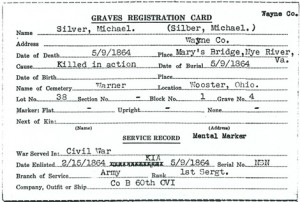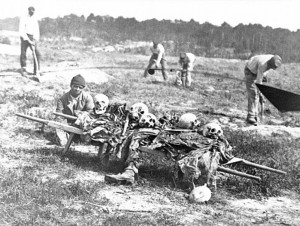There were many young men from Wayne County, Ohio that lost their lives during the Civil War. Since 150 years has passed it’s hard not to see them as names and numbers on a page. As cold statistics tallied from battlefield information. Yet we must remember every single one of those soldiers was an individual, a real human being, who lost his life. A life that mattered to his family, friends, and community. Behind every one of those individual deaths listed on a page in a history book lies an intimate story.
Some of those stories have been etched in stone, some have been forgotten, and some have been overlooked through the passage of time. Perhaps it was fate that stepped in to bring one of those Wayne County soldier’s story back to the present after recently stumbling across an old newspaper article that told the story of Michael Silver’s death during the Civil War.

The remains of Michael T. Silver/Silber lay in Pioneer (Warner) Cemetery, a private cemetery west of Wooster located down a farmer’s lane off the north side of Old U.S. Rt. 30 mid-way up the hill going toward the U.S. Rt. 250 crossing. This pioneer cemetery has been vandalized a number of times over the course of it’s long existence. Most notably in 1878 and recently in 2004 when $15,000 worth of damage was done to the property. Thankfully people have worked hard over the years to repair and preserve this cemetery and the memories of those buried there, which includes courageous Michael Silver, a Civil War casualty.
When the War broke out in 1861 Michael Silver likely struggled with the call to duty and his family obligations. His mother had been a widow since he was a toddler and he had no brothers, only two sisters. He was the male head of household by 1861 responsible for taking care of the family and their Plain township farm. For two years he watched as many of his friends went off to war. He was probably peppered with questions anytime he went to town: why an able bodied man such as himself had not volunteered yet? By 1864, at the age of 23, Michael Silver could no longer stand to sit on the sidelines and read about the war in the local newspaper or listen to the tales of his friends who had returned home after successful tours of duty. Patriotism must have overwhelmed him and in February of 1864 he signed-up along with over 100 other Wayne County men to serve 3 years with the second organization of the 60th Ohio Volunteer Infantry (sometimes referred to as the 1864 60th O.V.I. to distinguish it from the first 1862 organization of the 60th O.V.I. that had a 1 year term of service).
The Wooster (Daily) Republican, April 11, 1918 p. 6 had this to say:
…Michael Silver, then a young man, and one of the finest looking men in the county, of stalwart build and the picture of health, enlisted in the service at Wooster. He left behind a widowed mother and two sisters, Mrs. Sophia Mykrantz and Mrs. Kate Robinson, the latter now residing near Wooster. The mother resided on the farm now owned by the Mykrantz family west of Wooster, and although his services were needed on the farm, he responded to the call for volunteers.
The Wayne County volunteers reported to Camp Chase in Columbus, Ohio to be outfitted for war and get some brief training. They were formed into Company B of the 60th O.V.I. regiment that consisted of 10 companies that had around 100 men each from counties in Ohio.
Company A Franklin County
Company B Wayne County
Company C Ashtabula and Greene Counties
Company D Belmont and Ross Counties
Company E Morgan and Tuscarawas Counties
Company F Clinton and Meigs Counties
Company G Cuyahoga and Guernsey Counties
Company H Cuyahoga and Henry Counties
Company I Hamilton, Mercer and Montgomery Counties
Company K Hamilton County
Michael Silver must have shown some leadership abilities in training camp as Co. B’s Captain, Robert Eddy, chose Silver to be his 1st Sergeant, a non-commissioned officer position, also known as the “Orderly Sergeant”. In this position he would have been responsible for the conduct of the enlisted men and their performance of duty and would lead company and battalion drills and maneuvers. On hearing the drumbeat for orders, 1st Sergeant’s were to report to the Adjutants Office, write down the orders and immediately show them to the officers of their company and then inform the enlisted men to prepare for duty.
According to military records the 60th Ohio Volunteer Infantry was mustered into service on April 5, 1864. On April 19, 1864 they boarded a train in Columbus, Ohio and rode in freight cars bound for Washington D.C.; heading straight into the heart of the War at the time.
John H. Ellis, Company D of the 60th Ohio, gave a detailed account of the regiments movements and battles during an 1890 Reunion speech in Westerville, Ohio that gives us a glimpse into the final weeks of Michael Silvers life and where he died.
Ellis stated that after arriving in Washington and unloading from the train they immediately crossed the Potomac river at Washington, and went into camp near Alexandria, Virginia, where they were assigned to the 9th Army Corps (IX Corps) which reported directly to General Grant. Their next move was to a small station called Catlett Station, south of Alexandria. Here they again made camp and participated in severe training. Hours of drills intended to help prepare them for the battles soon to follow. Michael Silver as 1st Sergeant would have been helping to lead his Company through these drills. The training must have been intense as Ellis commented,
You all know how rigid and severe that drill was, but it was the best for us.
The 60th Ohio received their marching orders, about May 4, 1864, and would become part of what is now known as the Overland or Rapidan Campaign. The men were aware they would be heading out to engage the enemy and were all full of nervous energy. It was confusing, hustle, and bustle in Camp as they packed-up to march toward the enemy. They were given orders to take only what they considered really necessary as it was going to be a long march. In fact, it would become a history making march and John Ellis commented:
I will say that it was one of the most remarkable marches on record; and as that illustrious soldier, General Grant, says in his memoirs, it was one of the greatest marches in the history of the civilized world. Think of it. Green men carrying loads from forty to fifty pounds each, marching forty miles in one day.
A great many things had to be sacrificed along the 40-mile march. Despite orders to take only necessary things almost all the soldiers started out carrying a large amount of things that they had brought with them from home. Such as keep-sakes and mementoes that they did not want to discard, plus every man had a full knapsack, haversacks, and other accouterments necessary for a soldier.
Comrades, it is a wonder to me that there are any of us left to tell the tale. You all remember how we parted first with one thing and then another; with tears in our eyes we would throw away some memento, given us by a loving mother, sister or sweetheart, that our load might be lightened, so that we could endure the march, for we had a just pride in keeping up to the front, as Ohio had very few regiments in that army, and the 60th was bound to maintain the good name of our State at all hazard; even if we did strew keepsakes, choice bits of clothing, blankets brought from home, etc., along the road.
I can imagine now, after a lapse of twenty-six years, that I can see the road. Here you would find a pair of citizens pants; here a white shirt, a portfolio, perhaps a package of letters, small looking glasses, and then Government clothing, rubber blankets, parts of tents, and everything conceivable thrown along the roadside to lighten our burdens. What heartaches and sorrows those silent things told.
Its hard to say what things Michael Silver might have dropped along that road. Which items from home he held onto until he couldnt carry it one step further and had to toss it aside with tears in his eyes. The Wooster newspaper reported that Michael Silver got what was termed “sunstroke” shortly after his enlistment and was sent to a field hospital. It is likely that it was this 40-mile march that put him in the hospital.
While Michael Silver lay in a field hospital the rest of the 60th Ohio camped in the woods on the cliffs close to the Rapidan River. John Ellis related that,
We had, previous to going into camp; been in hearing of the artillery during the engagement of the wilderness, and of course, we were all speculating on our chances, for we were sure that that forced march was not for fun, and that we would soon be called upon to assist in the destruction of the enemy, or be destroyed ourselves.
They were not very pleasant thoughts, I can assure you. We stayed all night there in the woods, and next day crossed the Rapidan and marched some distance around through the fields, and halted close by a field hospital. I suppose they took us there on purpose to watch the wounded brought in, so that it would settle our nerves, for, by that time, our nerves were somewhat unstrung; but we were shortly moved up into the woods where they were fighting on every hand.
Then we knew that we were in the wilderness, and it was a veritable wilderness; scrubby trees, of different varieties, grew so thick that it was utterly impossible to see any distance in front. So thick were they that the underbrush had to be cut away in order that we would not be surprised by an advance, and to hear the firing on the right side of us, and on the left of us shrieks of wounded, made one think that we would be served as the children of Israel when they were in the wilderness — that none should see the promised land; but I am happy to state that there were several Joshuas and Aarons there as our presence here shows. We escaped from the wilderness pretty lucky, considering how badly scared we were.
After participating in the Battle of the Wilderness the 60th Ohio was marched toward Spottsylvania, Virginia. They knew there was going to be a fight there. In the field hospital Michael Silver heard about the impending battle in Spottsylvania. Silver along with a number of others left their sick beds and followed the troops to rejoin them near Spottsylvania. He was not going to miss another fight.
Early on the morning of May 9, 1864 Michael Silver likely got the orders for the 60th Ohio Infantry to deploy and drive the enemy’s skirmish line across the Nye River, to take possession of the hill beyond and hold it, until the rest of the division had crossed.
John Ellis recounts the event:
We all remember the morning of the 9th of May — how we were formed to march, with our regiment in the extreme advance. Comrades, did it ever occur to you why they put our regiment in the advance, and it being a green one at that — not yet four weeks old? It did to me, and that is, that we showed such good staying qualities on our march from Catlett Station to the wilderness, and that they were not afraid but what we would keep out of the way of the veterans behind us, and it is fitting to say here, that the 60th did not allow any regiment of veterans or otherwise to tramp our heels.
On that march that morning, General Wilcox and staff were ahead and ran into the enemys picket, and of course they came back in a hurry. General Wilcox came riding up to our regiment and asked Colonel McElroy how the Ohio boys were on the advance. The Colonel answered and said: “You need have no fear about the Ohio boys.” So we maintained the position we held; however, we were assured that there were only a small number of Johnnies left as rear guards, and we would soon do these up.
Of course you all remember how we did them up; so there were two companies selected as skirmishers, and they deployed and advanced up the hill, that is after crossing the Nye River, and it was not long before their advance was interfered with by an overwhelming number. They fell back to the main line, and as the 60th was some distance in advance of all the others, they received the full shock of the advancing rebels.
I was close by General Wilcoxs side when that took place, and the enemy came out of the woods in front and on each flank, and opened on us, and then how the dust flew. After they had been engaged for some time, General Wilcox said: “The fools (meaning the 60th) did not know when they were whipped.” Then he ordered one of his staff officers to go at once and order up other regiments to our relief. During that fight, which did not last long, we lost in killed or wounded, more than one-half of those actually engaged.
It was there at the Battle of Marys Bridge on the Nye River, that Michael Silver lost his life. The Wooster Republican newspaper reported that during the battle several color bearers had already been shot down. Despite this fact, Michael Silver seeing the colors on the ground picked up the flag and began to wave it, likely to rally the troops and encourage them to hold their ground. But as he waved the colors making himself a target of attack, he quickly became the victim of a bullet, being shot by a Confederate sharp-shooter. He was mortally wounded and died on the field of battle. His comrades later buried him on the battlefield, marking the grave the best they could before having to move on. The Battle of Marys Bridge on the Nye River is often overshadowed in history books as two days later the men of the 60th took part in a far greater fight at the Spottsylvania Courthouse on May 12, 1864 in which they suffered even greater losses.

The 60th O.V.I. continued to participate in some of the bloodiest hand-to-hand combat that took place in the final months of the War. But the War was over for Michael Silver: killed in action May 9, 1864. A gloomy pallor swept over the community when the news reached Wooster, Ohio that Michael Silver had been shot and killed. Wayne Countys Company B also lost Thomas Moreland, and Isaac Bell that day.
A year after his fellow soldiers saw Silver fall on the battlefield, two Wayne County men, John Bucher and Silvers brother-in-law John Robinson, returned to Nye River, Virginia. They searched the old battlefield and found Michael Silvers grave marker. They dug-up the remains, identified the remains, and brought him back for reburial in Warner Cemetery. Where it was said a beautiful monument was erected in his memory with the words, “Killed in Battle. Michael Silver, aged 23.” along with an appropriate verse in memory of his bravery also inscribed on the stone.

Comments are closed.